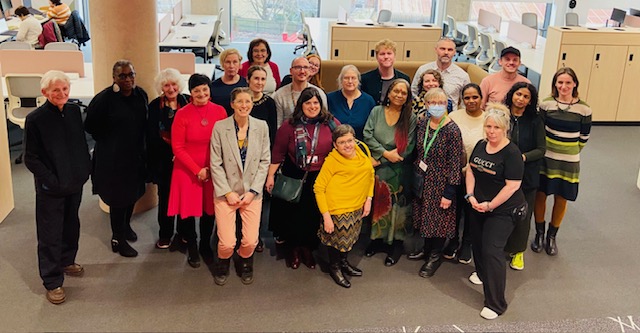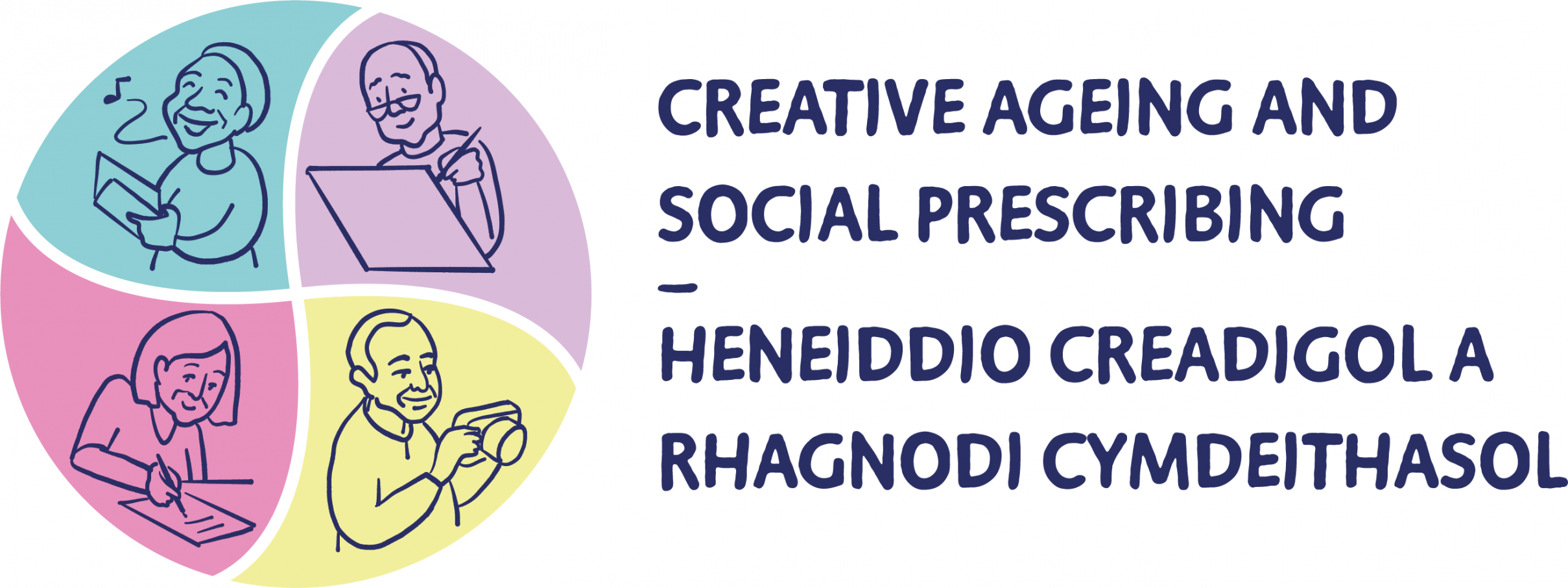Professional community engagement and co-design meeting
29 January 2023
This meeting brought together all the project partners to discuss their experiences organising creative activities that include and engage older people, reflect on the hi and low touchpoints of the journey and identify priorities for the co-design groups to work on.
The event included presentations from three external guest speakers to discuss how local creative practices in Wales connect to the ‘bigger picture’.
Presentation by Dr Amrita Jesurasa on social prescribing
Amrita spoke about the links between public health and community health and described a conceptual model of social prescribing in Wales. The social prescribing pathway requires a professional based in health, social care or the voluntary sector to refer an individual to make us of community assets. These include nature based, exercise or creative interventions as well as accessing support hubs. Social Prescribing has a role in income maximization by supporting people accessing financial advice. The Wales School for Social Prescribing Research is working towards developing the evidence base and an outcomes framework.
The Social Prescribing Interfaces report highlights the synergies and the distinctions between:
- physical and mental health services;
- wellbeing activities and community assets; and
- social prescribing
One of the recommendations was to support the interaction and synergy between all components in the social prescribing interface model, by making equitable population health and wellbeing central to the planning of services.
Presentation from Emily Van de Venter on mental wellbeing
Emily talked about her work leading strategies to support mental wellbeing in the community, self-advocacy, social connections, connection with self, others and the world around us. Group activities can help address loneliness and isolation. Connecting with nature can focus our attention and bring us tranquility and peace. Being focused on that activity can help build mental and emotional energy.
Public Health Wales aims to launch a new programme of work, Hapus, which is partly about having a national conversation to encourage people in Wales to focus on what is important to them for their mental well-being and to make time to participate in activities that promote and protect. The programme is underpinned by an evidence-based conceptual framework which depicts key elements of mental well-being and the interaction between individual and community wellbeing. The framework recognises how we think and feel is influenced by a range of psychosocial factors, past and present experiences, our health behaviours and health status, as well as wider determinants of health.
Guest Speaker: Jazz Browne, Nubian Life
Nubian Life charity operating a community resource centre in the London Borough of Hammersmith and Fulham. It was established in 1995 in direct response to a gap in the service provision within the borough for its aging African Caribbean population. Their clients call them a club as they feel safe there and their needs are met. An activity highlight was going into the recording studio to record their favourite songs, the songs were also prefaced with the historical and cultural context to help familarise the patients with the songs again. Music is a key part of the reminiscence activities. Staff are also involved in advocacy services when clients are admitted to the hospital. Playing the music familiar to the client in the hospital helped a client with dementia to communicate again, taking her to a place of wellbeing, and the songs were also then played when the client went back home.
Social prescribing could be a range of things, not just the arts. Sometimes the focus is on people and connections rather than the activity itself. The arts activity becomes the conduit for the much needed connections to be made.
Presentation from Dr Sofia Vougioukalou, Cardiff University
Social Prescribing is complex and often exclusive. Barriers in the form of access and digital literacy etc. This project aims to shed light on who is excluded from social prescribing and why. Creative practitioners and service users hold most of the information on impact – oral, experiential and private body of knowledge.
All information collected as part of the research is anonymized and the beauty of that it can be synthesized thematically without compromising any individual or organisation. The key aim is to identify themes in the data.
A key theme that was identified in the creative practitioner interviews was the difference between creative activities that have a demographic-specific membership vs open sessions that are open to the community. There is a need for both depending on the group/community. Both have advantages. There is safety in a closed group e.g for those with dementia as participants can identify with other in the same situation. There is potential to move onto open group after the closed group. Open groups can lead to the development of inter-group connections which is a pathway to the reduction of discrimination. Closed groups can attract people who would not normally be reached.
Another theme identified in the interviews was the difference between promoting activities as ‘arts and health’ vs ‘skills based creative training’. For example, older men with depression wouldn’t necessarily join a mental health choir but would join a local men’s choir. Therefore access is dependent not only on the content of the activity but on how it is marketed.
Presentation from Sally Lewis – Arts Council of Wales
Arts and health is a partnership. Arts Council Wales has a memorandum of understanding with the Welsh NHS Confederation. The aim is to reach and engage everyone in Wales by working with the NHS, Public Health Wales and Social Care.
- We have invested in every health board across Wales by helping to put a Arts and Health Coordinator in each 7 health boards through the capacity building programme.
- Arts and Minds – partnership with the Baring Foundation to support mental health projects in the health boards, e.g Hywel Dda worked with CAMHS in an ariel project for young carers.
- Lottery funding – this fund (unlike other arts council funds) specifically requires a partnership between an arts organization or artist and a health partner (e.g charity/health board/housing association). Health and wellbeing need has to be shared by both oragnisations. The arts council Create fund is aimed at community arts projects.
- HARP Programme recommendations identified four stages of arts and health interventions: Groundwork – Test – Invest – Scale
- Cultural Cwtsh – online resource aimed at health and social care staff. Includes videos on Bollywood dancing, music making, craft, photography etc.
The Arts Council for Wales is striving for a Wales that embraces and promotes access to the arts and creativity as essential pillars of good health for all. The aim is for this work to be mainstream and available to all. Arts support our health and wellbeing, this is a by-product of engaging with the arts. We are challenged by art and the arts provide meaningful experiences and help develop confidence.
Transition of services from medical to arts is hard to achieve. Positioning work in prevention can help start to shift the resource and energy into the community. Sustainability is also important in this context as community work cannot run on good will alone – requires a consistency in funding.
Thoughts from Collaborators on priorities for improvement:
- A lot of funding comes from project-based funding, therefore, social prescribing should be available consistently for people to be referred to otherwise they will fall through the gaps in provision. Head4Arts are only able to provide monthly sessions as that is the scale current funding can support. Sustainability of sessions is always under threat. Social prescribing currently works through GP clusters referring individuals but not many arts organisations know how to become known to make their services known to link workers.
- Challenges around reaching ethnic minority older people was then discussed. Language barriers – older black and ethnic minority women – don’t always want to join in what is currently on offer for the general population and they struggle to connect with those groups. There is a BAME outreach officer in Swansea Bay health board that could help with reaching minority groups. Local authorities will have similar roles.
- Partnerships sometimes don’t work as one side are not as invested. In the lottery fund the partnership roles need to be clearly defined in the application. The arts council can help broker partnerships.
- It was suggested that words like lonely or isolated shouldn’t be used when trying to attract those groups – skills based workshops more likely to attract people.
- Some workshops won’t work for every individual, therefore, people should be able to leave after one session if they want, offering taster sessions can help combat hesitation.
- It’s important to be able to safeguard the existence of safe spaces but people need to be able to express their opinions and the activity organisers need to have a system in place to hold the dialogue and guide the conflict resolution. Reality Theatre prefers to talk about ‘brave spaces’.
Further details
Date: 26th January 2023
Time: 12-4pm
Location: SPARK, Maindy road, Cardiff CF24 4HQ
Hosts:
Y Lab: Sofia Vougioukalou, Hollie Withers, James Lewis
Arts Council Wales: Sally Lewis, Elinor Lloyd-Davies
Guest speakers:
Nubian Life: Jazz Browne
Public Health Wales: Amrita Jesurasa, national lead for social prescribing and Emily van de Vender, national lead for mental wellbeing
Public involvement group members:
Sara Beer, Mal O’Donnell, Eirwen Malin, Kalpana Natarajan, Sharmila Panneerselvam
Collaborators:
Swansea Bay University Health Board: Johan Skre, Iori Haugen
Disability Arts Cymru: Nye Russell-Thompson
Sub-Sahara Advisory Panel: Rehanna Jaffer
Women Connect First: Amal Beyrouty
Pride Cymru: Cath Harrison
South Wales Gay Men’s Chorus: Dan Latham
Forget-me-not chorus: Sarah Teagle
Head4Arts: Kate Strudwick
Impelo: Suzy West
Reality Theatre: Juls Benson, Jack, Joe Wagstaff,
Age Cymru: Kelly Barr
